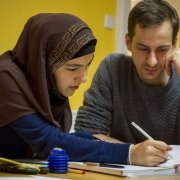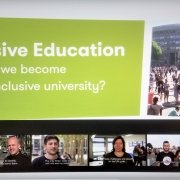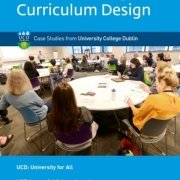The Centre for Teaching and Learning and Widening Participation
Excerpt

The Centre for Teaching and Learning at Malmo University supports both academic staff and students. The Centre shall, in cooperation with all schools and faculties, ensure that the students at Malmo University will have the possibility to reach their full potential during their academic studies by coordinating their academic introduction and offer academic support. The Centre also offers professional development courses and consultative support to teachers within educational development. Furthermore the centre shall develop educational methods in order to take advantage of diversity among students and staff. Finally, the Centre for Teaching and Learning has a reasonability to follow up and research the effects of the university’s work on educational development, widening participation and inclusion.
Narrative, origins and objectives of the initiative
What kind of project is this? Please give a short description (summary) of it.
The Centre for Teaching and Learning at Malmo University is a centre for Educational Development and Professional Development for university teachers. One special task is to prepare teachers to teach and support a diverse student population. Since July 2018, the centre has also been serving as a hub for the widening participation and academic support for students. By bringing the two tasks together, the university emphasises the fact that a diverse student body is a driver for pedagogical development. The centre is also responsible for the virtual learning environment and the development of the physical learning environment, which is an other aspect of inclusive education. Finally, the centre will conduct research on teaching and learning as well as on widening participation.
Please tell us why, in general, this project is considered a successful one?
The organisation offers a possibility to work with inclusive pedagogy from both student and teachers' perspective, and in collaboration/partnership with both students and teachers. This will ensure that the inclusive perspective is an integrated part of the educational skills development and not be discussed separately. Similarly, when teachers identify needs of academic support for students, it can be developed into activities for students much faster.
And why would you consider it a grass-roots initiative?
Since this is a descision made by the university, it is not a true grass-roots initiative. On the other hand, it is an initiative of one single institution.
What challenges needed to be solved in this project?
Educating for a sustainable community is perhaps the most significant challenge for higher education. Malmö University sees a special connection between social sustainability, democracy and an inclusive education. Educational development is one way to strengthen the link between education and democracy, which is one of several reasons for the centre's double mission.
All students at Malmo Univeristy should be given the opportunity to perform at their best in order to meet society's challenges. Educational methods need to be grounded in research and they need to support inclusive and student-active learning. The Centre of Teaching and Learning is one way of addressing these challenges.
The main challenges for the centre as such have been organisational. The double target group (students and teachers) has been a driver for new ways of working. We have experienced some skepticism from university teachers both towards widening participation and towards the need of pedagogical training, but that is decreasing. A constant challenge is to get funding for research on development of inclusive pedagogy in Higher Education.
Is this initiative based on any particular theoretical framework? Which one?
The Centre for Teaching and Learning works in many different areas with their own theoretical frameworks, out of which we would like to mention: The Scholarship of Teaching and Learning (SoTL), Students as Partners, Universal Design for Learning (UDL) and the framework of Academic Literacies.
The underlying theoretical framework, however, is a sociocultural theory and the idea of learning happening as part of a social activity in a social context. Malmo University is in the process of developing a theoretical framework of Challenge Based Learning, which is a way of combining collaborative and student active pedagogical methods with attitudes towards learning and the role of universities.
Further reading:
On SoTL: Boyer, Ernest L. (1990). Scholarship reconsidered: priorities of the professoriate. Princeton, N.J.: The Carnegie Foundation for the Advancement of Teaching
On UDL: Burgstahler, Sheryl (red.) (2015). Universal design in higher education: from principles to practice. Second edition. Cambridge, Massachusetts: Harvard Education Press
On Students as Partners: Healey, M, Flint, A & Harrington K (2014) Engaging students through partnership: students as partners in learning and teaching in Higher Education. London; Higher Education Academy
On Academic Literacies: Lea, Mary R. & Stierer, Barry (red.) (2000). Student writing in higher education: new contexts. London: Society for Research into Higher Education
(Appendix) Is your intervention standing on its own or is it a part of a bigger and more holistic approach?
The centre plays a key role as a resource centre in achieving university-wide goals relating to inclusiveness, and it focuses on issues concerning widening participation among both students and teachers. It is part of, and a way of fulfilling, the Malmo University Strategy 2022. One out of three, overarching goals for the university is to:
- Offer education grounded in research, in terms of teaching methods as well as subject matters, which provides the conditions for inclusive and student-active, life-long learning.
https://mau.se/contentassets/c8c53c0e8d464830ba798ed2485a7c17/malmo-university-strategy-2022_eng.pdf
Please describe the group(s) intended as beneficiaries of this initiative
Why has this group (have these groups) been chosen?
The final target group is students at Malmo University. They are the direct target group for the academic support, introductory courses and activities, and they are also the indirect target group of the educational and professional development courses and activities for university teachers.
Could you please tell us something about the relative size of the (of each) target group, within the school/university population, region and/or country?
The university has 24 000 students, 250 PHD students and 1800 staff members.
Which social characteristics are taken into account and what is the geographical area covered?
Currently, one third of the university’s students have foreign backgrounds and two thirds come from a non-academic environment. Many of our students arrive straight from secondary school; others have worked for a few years and then decided to study or change careers. Students come from all over Sweden but a majority are recruited from the city of Malmö and the surrounding area. The diversity within the student population is however, not mirrored among the teachers and staff.
On which level is the project implemented?
At university/insitutional level.
The Centre reports directly to the Deputy Vice Chancellor and is represented in the Board of Education, The Advisory Board for Widening Access And Participation, the Advisory Board on Digitalisation and in the Advisory Board on Global Engagement. The Center is organizationally placed at the Faculty of Education and Society.
Please describe the political and socio-economic factors that you believe have been important enablers for your initiative
Did the initiative have political support?
Yes. The fact that Malmo Univerisity has had an outspoken aim to attract non traditional students in to Higher Education from the start in 1999 has been important for the way the Centre for Teaching and Learning has developed since the start in 2012.
How did it fit with local, regional or national policies?
Very well. In Sweden, Widening Access is regulated by law as a mandatory task for all universities and the government has initiated a renewed focus on teaching and educational enhancement this year (2018). Also, at regional and local level the current policy is to rise the level of education and make education at all levels more inclusive.
Who are the stakeholders supporting the initiative?
The University Management, The Student Union, The Student Center, five faculties/schools.
Are there particular demographic changes present that are influencing the project?
No, not really
What is the institutional strategy and culture of the (educational) organization?
To identify future challenges, higher education needs to include multiple perspectives and a diverse student population is therefore a prerequisite for higher education institutions to help meet future societal challenges. Malmö University aspires to reflect the community at large, since we believe that a diverse student population is important for social justice and democracy, but diversity is also a matter of quality in the education we offer. The university therefore strives to be open to all. A diversity of skills, experiences and perspectives enriches the content of higher education and contribute to the development of a critical approach to knowledge and various complex social phenomena. By meeting different perspectives during their education and training, will better prepare students for tomorrow's working life. By sharing each other's different perspectives and skills in relation to a unique issue or problem, they can broaden their horizons and develop their critical approach to knowledge, which is the goal of higher education. Students' different perspectives and insights are important preconditions for maintaining a high quality of courses and programs.
Malmo Univeristy therefore offers a challenge-based and student-centered pedagogy that takes advantage of the students' diverse backgrounds, skills and experiences. That is aimed towards all students being given the opportunity to perform at their best in order to be able meet society's challenges.
To what extent does the initiative have an influence on institutional policy (or potential influence) of the (educational) organization?
By addressing both students and teachers, the centre influences the education at Malmo University.
By representation in a number of Advisory Boards the Centre for Teaching and Learning both influence and is influenced by the institutional policy.
(Appendix) Is there public support for your initiative and the issue it addresses?
There is support among students, staff and management.
(Appendix) What other factors do you think have been important for the success of this initiative?
The commitment and competence among the group of staff connectors to the centre.
The clear and outspoken support from the university management and policy.
The fact that the Centre for Teaching and Learning is a permanent part of the faculty and core activity of the university and not organised as part of administrative support.
Please describe the overall initiative design and the methods and tools used to reach the goals
Please describe the specific activities carried out.
The centre offers a number of activities: courses, workshops, research circles, consultative support, conferences and theme days etc.
The main idea is that students and teachers are creating knowledge together as partners. This is expressed in the magazine "We make knowledge together", which addresses both staff and students.
For university teachers it's mandatory to gain at least 15 ECTS of pedagogical courses. All these courses are open to people outside the university. By including other perspectives and experiences in the professional development courses, we believe quality is enhanced, the same way we believe a diverse student body is a quality factor for higher education.
Some of the courses that mirrors the double task for the centre are:
- Educating for Critical Thinking and Criticality
- Challenge based Learning
- Theoretical and Practical Perspectives on Student Writing in Higher Education
- Educating for Internationalisation and Global Engagement
- Gender Awareness in Education
It's also possible to apply for seed money for educational development project in which students are part of the planning and implementation. For students we organise the Language workshop and for both teachers and students we offer language courses in both Swedish and, as a second language, English. We also work together with the Student Centre around the introduction to studies, early alert and students with special needs.
The centre collaborates with the different departments and administrative sections and directly reports to the Deputy-Vice Chancellor. To ensure that the centre works for the university as a whole and to find support for this work, an Advisory Board for widening access and participation, comprising representatives from the different departments, the joint administration and the student union has been established.
What were the key roles (teacher, student, management team etc.) within the project?
Educational developers, teachers, researchers, IT-instructors, students, student mentors
What ideas, tools, theories, models, methodology (etc.) have been used to reach the goals?
Scholarship of university teaching (SoTL), Academic literacy, Challenge Based Learning, Students as partners, Critical Pedagogy (see above).
What are the final revenues of the project?
The Centre for Teaching ans Learning was evaluated by an external evaluator in the spring of 2018. The re-organisation was decided on in 2018 and will be evaluated 2022. The centre was also indirectly evaluated by the Swedish Higher Education Authority when the evaluated the the framework for quality at Mau 2018-2019. The concluded that the centre "...contribute to the fact that teaching has a strong position in the entire University and the higher education development support responds to the teaching staff's overall needs".
Please describe if your project ensured its sustainability
If so, how did you ensure the short-term impact of the project?
By an on-going dialogue with stakeholders within the university, from students and colleagues to university management. By evaluating each activity. The centre reports back to the University management every 6 months.
And how did you ensure the long-term impact of the project?
By reporting results once a year, by evaluating the centre app. every fifth year.
The result of the work on widening access is harder to evaluate.
Has your project been replicated elsewhere?
Not that we know of.
Please tell us about the resources used in this initiative
What was the budget for the initiative?
The ECTS-courses for students and staff are funded the same way as any other education.
The budget for the center as a whole is decided at university level. The funding for 2018 was around 900 000€ in total.
How much did the initiative depend on volunteers?
Not at all (though many of the teachers invest unpaid hours in their work).
How were the costs perceived by the public/the sector/other stakeholders?
Since it's part of the university budget, it has been accepted by the University Board where both, students and staff are represented.
To what extent did the initiative achieve its objectives?
Please describe the evidence to support the success of your initiative.
It is too early to tell when it comes to the broader mission including students and widening participation. The original task has been evaluated (see above) with very positive result.
Did the intervention lead to any unintended (positive) outcomes?
What indicators (quantitative and qualitative) have you measured to demonstrate success?
1 satisfaction among participants, 2 demand for courses and consultative support (number of participants and number of consultative assignments), 3 the general perception of the centre within the university.
(Appendix) How did you evaluate/monitor this intervention?
Each activity is evaluated by the centre itself. The Centre as such has been evaluated directly by an external evaluater and indirectly as part of the national evaluation of the quality work at the university.
Reports can be accessed on the links below (in Swedish only):






